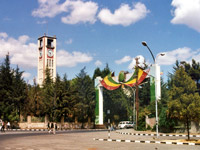Airport
Addis Ababa Bole International Airport
IATA Code: ADDLocation: The airport is situated five miles (8km) from Addis Ababa.
Time: GMT +3.
Contacts: Tel: +251 (0)1 180 454.
Transfer to the city: A regular coach service connects the airport to the city centre. This service is provided for departing passengers by Ethiopian airlines.
Taxis: To avoid haggling and overpricing use the yellow/cream coloured government taxis parked at the terminal. Taxis are also available outside the terminal building. Expect to pay around Birr 60 (approximately US$7) for a ride into the city centre; make sure you agree on this fee with the driver before starting your journey.
Car rental: Car rental is available at the airport.
Facilities: Facilities include a bank and bureau de change, restaurants and bars, duty-free and gift shops, travel agents, a post office, and a tourist help desk.
Parking: Public parking lots are located near the entrances of each terminal.
Departure tax: A Passenger Service Charge of US$20 is levied on all foreign passengers.
Website:
Visit worldtravels.com for the full guide to Addis Ababa. Build a complete Addis Ababa travel guide and email to your clients - sign up for a trial subscription of World Travels Pro.
Addis Ababa

Addis Ababa (sometimes spelt Addis Abeba) is a diverse and riotous capital city of nearly three million souls, with roughly 80 different nationalities, and a multitude of religious and language groups making up its colourful population.
Nestled at the foot of Mount Entoto, the city was founded in the late 1800s by Ethiopian emperor Menelik II and was later occupied by the Italians during the second Italo-Abyssinian War. When Ethiopians regained control, Emperor Haile Selassie immediately set about rebuilding the capital and formed the Organisation of African Unity, replaced by today's African Union, which has its headquarters in the city.
Addis Ababa is also home to the world-renowned early hominid Lucy - her fossilised skeleton, as well as a replica, are housed in the Ethiopian National Museum. The city also boasts the largest open market in Africa (in the Merkato district), several interesting mosques and cathedrals, as well as the world's largest prefabricated building, Shengo Hall, and Menelik's old Imperial Palace, which is the official seat of the Ethiopian government.
Addis Ababa is an interesting mix of poverty and wealth, urbanisation and nature (the city is surrounded by forests and cultivated land). It is a dynamic capital, but has its fair share of unemployment, petty crime and destitution. Addis Ababa, however, is well worth exploring, as there are plenty of 'diamonds in the rough' to be uncovered.







